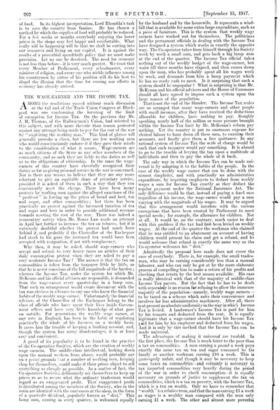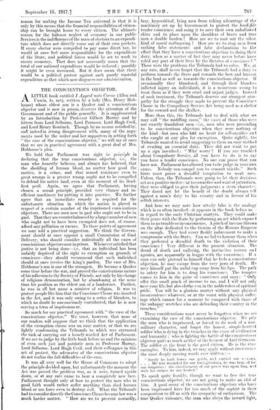THE WAGE-EARNER AND THE INCOME TAX.
AMONG the resolutions passed without much discussion at the tail end of the Trade Union Congress at Black- pool was one condemning the lowering of the limit of exemption for Income Tax. On the previous day Mr. J. H. Thomas, of the Railwaymen's Union, had referred to this subject, and with more rhetoric. than reason protested against any attempt being made to pay for the cost of the war by " exploiting the working man." This kind of phrase will generally provoke a cheer, but there are few working men who would conscientiously endorse it if they gave their minds to the consideration of what it means. Wage-earners are as much citizens of the State as any other 'limbos of the community, and as such they are liable to the duties as well as to the obligations of citizenship. In the mass the wage- earners of this country have cheerfully recognized their ditties so far as giving personal service in the war is concerned. Nor is there any reason to believe that they are any more reluctant to give an equitable share of pecuniary service, provided it is asked of them in such a way that they can conveniently meet the charge. There have been many protests by working men against the alleged exactions of the " profiteer " in forcing up the prices of bread and beef, tea and sugar, and other commodities ; but there has been practically no protest against the increased taxation of tea and sugar and beer in order to provide additional revenue towards meeting the cost of the war. There was indeed a momentary outcry when Mr. Bonar Law made an attempt in April last further to increase the tax on tobacco, but it is extremely doubtful whether the protest had much force behind it, and probably if the Chancellor of the Exchequer had stuck to his guns the increased tax would have been accepted with resignation, if not with complacency.
Why then, it may be asked, should wage-earners who accept and submit to very heavy taxes on articles of their daily consumption protest when they are asked to pay a very moderate Income Tax ? The answer is that the tax on commodities is taken from the taxpayer little by little, so that he is never conscious of the full magnitude of the burden ; whereas the Income. Tax, under the system for which Mr. McKenna and his official advisers are responsible, is demanded from the wage-earner every quarter-day in a lump sum. That such an arrangement woad create discontent with the tax was obvious in advance to any one who knew the financial habits of the weekly wage earner. Unfortunately the financial advisers of the Chancellor of the Exchequer belong to the clans of officials who have spent their lives inside Govern- ment offices and have very little knowledge of what goes on outside. For generations the weekly wage earner, at any rate in England, has been in the habit of regulating practically the whole of his finances on a weekly basis. It saves him the trouble of keeping a banking account., and, though the system has many disadvantages, it is at least caay and convenient.
A proof of its popularity is to be found in the practice of the Co-operative Socities, which are the creation of weekly wage earners. The middle-class intellectual, looking down upon the manual workers from above, would probably say on a priori grounds I hat a number of working men, keeping shop for themselves, would mako it their prime object to sell everything as cheaply as possible. As a matter of fact, the Co-operative Societies deliberately set themselves to keep up prices so as to secure what the ordinary tradesman would regard as an exaggerated profit. That exaggerated profit is distributed among the members of the Society, who in the main are identical with the customers at the shop, in the form of a quarterly dividend, popularly known as " di Vi." This lump sum, coming in every quarter, is welcomed equally
by the husband and by the housewife. It represents a wind- fall that is available for some extra-large expenditure, such as a piece of furniture. This is the system that weekly wags earners have worked out for themselves. The politicians and the permanent officials in dealing with the Income Tax have designed a system which works in exactly the opposite way. The Co-operator takes from himself through his Society week by week a small sum, and gets back a big lump sum at the end of the quarter. The Income Tax official takes nothing out of the weekly budget of the wage-earner, but waits till three months have elapsed, and then comes down upon the man, who has probably spent all his wages week by week, and demands from him, a lump payment which he has no ready cash to meet. Is it surprising that such a system should be unpopular ? What is surprising is that Mr. McKenna and his official advisers and the House of Commons should all have agreed to impose such a system upon the large masses of the population. That isnot the end of the blunder. The Income Tax scales are so arranged that many wage-earners and other people with small incomes, after they have received the deductions allowable for children, have nothing to pay. Roughly speaking, nearly half of the million or more persons brought within the Income Tax limit by Mr. McKenna's reform pay nothing. Yet the country is put to enormous expense for clerical labour to hunt down all these men, to examine their accounts, and finally give them a free quittance. In any rational system of Inenne Tax the scale of charge would be such that each taxpayer would pay something. It is absurd to go to the trouble of levying the tax upon a multitude of individuals and then to pay the whole of it bark.
The only way in which the Income Tax can be made uni- versal is by adapting it to the habits of the people. In the case of the weekly wage earner that can be done with the utmost simplicity, and with practically no administrative expenditure, by requiring employers to deduct from weekly wages a sum for Income Tax exactly as they deduct the regular payment under the National Insurance Act. The only difference would be that, instead of paying a fixed sum regardless of his income, the wage-earner would pay a sum varying with the magnitude of his wages. It may be argued that this arrangement would interfere with the various exemptions that have been created by Parliament to meet special needs ; for example, the allowance for children. Not at all. It would be, on the contrary, much easier to deal with this problem if the tax had first been levied on weekly wages. At the end of the quarter the workman who claimed that he was entitled to an abatement on account of having children would present his claim and get a refund, and ho would welcome that refund in exactly the same way as tho Co-operator welcomes his " divi."
Admittedly the proposal here made does not cover the case of everybody. There is, for example, the small trades- man, who may be earning considerably less than a manual labourer, and who can only be got at by the more elaborate process of compelling him to make a return of his profits and checking that return by the best means available. His case is really identical with that of the majority of middle-class Income Tax payers. But the fact that he has to be dealt with separately is no reason for refusing to allow the immense majority of the population—namely, weekly wage earners— to be taxed on a scheme which suits their convenience and involves far less administrative machinery. After all, there is at present no absolute uniformity in the way in which Income Tax is levied. A landowner's Income Tax is paid for hint by his tenants and deducted from the rent. It is equally legitimate that a wage-earner should have his Income Tax raid for him by his employer and deducted from his wages. And it is only by this method that the Income Tax can be made universal.
The advantages of making it universal are twofold. In the first place, the Income Tax is much fairer to the poor than a tax on commodities. A man earning a poand a week pays exactly the same tax on tea and sugar consumed by his family as another workman earning £10 a week. This is grotesquely unfair, and though it may be necessary to keep some taxes on commodities—and certainly is necessary to tax imported commodities very heavily during the period of the war in order to check consumption---it is equally necessary on grounds of justice to supplement the tax on commodities, which is a tax on poverty, with the Income Tax, which is a tax on wealth. Only we have to remember that " wealth is a relative term, and that the man earning £3 a week as wages is a wealthy man compared with the man only. earning £1 a week. The other and almost more powerful reason for making the Income Tax universal is that it is only by this means that the financial responsibilities of citizen- ship can be brought honie to every citizen. The ultimate reason for the hideous neglect of economy in our public Services is the indifference of the mass of electors to an expendi- ture which does not directly come out of their own pockets. If every elector were compelled to pay some direct tax, lie would at once feel some responsibility for the expenditure of the State, and political forces would be set to work to secure economy. That does not necessarily mean that the total of our national expenditure would be reduced ; possibly it might be even increased. But it does mean that there would be a political protest against such purely wasteful expenditure as that which now disgraces our administration.



























 Previous page
Previous page